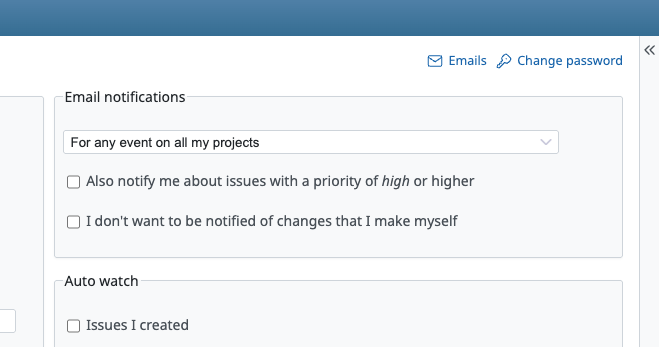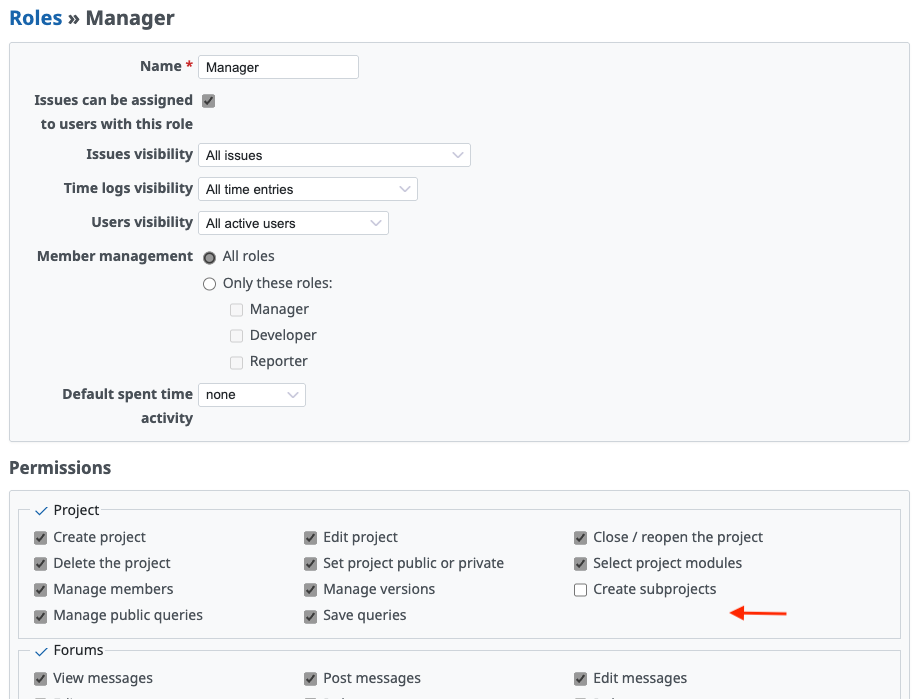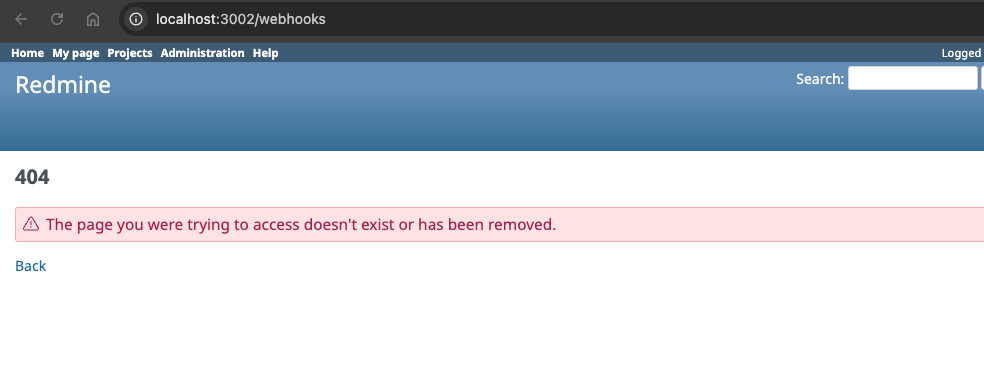Feature #29664
closed
Webhook triggers in Redmine
Description
To have Redmine be able to at least use POST method with web hooks upon multiple events, similarly implemented in GitLab or GitHub. This will allow to integrate Redmine into other networks, which people may use for team communication.
Webhooks have been implemented for the following objects:IssueNewsTimeEntryVersionWikiPageVersion
Files
Related issues
 Updated by Anonymous over 7 years ago
Updated by Anonymous over 7 years ago
The only related feature I found: https://www.redmine.org/issues/23368 but is closed
 Updated by Go MAEDA about 7 years ago
Updated by Go MAEDA about 7 years ago
- Related to Feature #23368: webook/push notifications added
 Updated by Go MAEDA about 7 years ago
Updated by Go MAEDA about 7 years ago
- Has duplicate Feature #3971: Add new notification abitily. added
 Updated by George Chester about 5 years ago
Updated by George Chester about 5 years ago
This would be really nice. I'm trying to join in Camunda BPM into a ticket so a ticket can be assigned a proecess. Webhooks would be wonderful.
Anyone got ideas?
 Updated by Ferdinand S almost 4 years ago
Updated by Ferdinand S almost 4 years ago
I would also benefit form this feature greatly. We use Shortcut (shortcut.com) as a Scrum tool and it would be great if we could consume Redmine webhooks in order to update user stories in Shortcut.
Is there any plan for this feature?
 Updated by Jens Krämer 10 months ago
Updated by Jens Krämer 10 months ago
The attached patch implements web hook support - to call / notify external services when something happens in Redmine.
While this patch just implements the issue create / update / delete events, it was built to be easily extended for lifecycle events of other entities.
Web hooks are defined at the user level, and always run in this users' context, regardless of who triggered the actual event. Events on issues a user cannot see will not trigger this users' configured hooks. The hook payload is JSON and has type (event), timestamp and data (the object involved) top level elements, using the existing issues/show API template for consistency to render the issue data inside data.
Each hook is defined for a list of events and projects. Whenever one of the events occurs in one of the projects, a POST request is sent to the configured URL with a payload depending on the event. Webhook signing with a pre-configured secret is implemented using the same algorithm GitHub uses .
This feature was developed and is in production use at Planio .
We'd very much like this to be integrated into Redmine, since it is really powerful when combined with platforms like Zapier or IFTTT. Zapier for example allows to define transformations (using Javascript) to change the JSON payload before triggering an action on another service and can therefore work as an adapter between Redmine and another service, even if the original payload format is not what the other service expects.
 Updated by Go MAEDA 10 months ago
Updated by Go MAEDA 10 months ago
Thank you for sharing this great patch developed at Planio! I believe it would be a very valuable improvement to Redmine.
I have just one concern: currently, it seems that any user can create webhooks.
Since webhooks automatically send data to external services, some administrators might want to restrict or even disable their use for security or data protection reasons.
To support such requirements, I think it would be helpful to have permission settings to control who can create or use webhooks.
 Updated by Jens Krämer 10 months ago
Updated by Jens Krämer 10 months ago
Yes, I agree that some organizations might want to limit who can use this feature even if users only could share data they can actually see. I'll update this issue with a second patch that implements this soon.
 Updated by Jens Krämer 10 months ago
Updated by Jens Krämer 10 months ago
- File 0001-Issue-Webhooks.patch 0001-Issue-Webhooks.patch added
- File 0002-adds-the-use_webhooks-permission.patch 0002-adds-the-use_webhooks-permission.patch added
I rebased on current master, added a `use_webhooks` permission and also fixed some random test failures related to the caching of the IP blacklist configuration.
 Updated by Marius BĂLTEANU 9 months ago
Updated by Marius BĂLTEANU 9 months ago
- Related to Feature #31006: Add feature Webhook added
 Updated by Marius BĂLTEANU 5 months ago
Updated by Marius BĂLTEANU 5 months ago
- Target version changed from Candidate for next major release to 7.0.0
 Updated by Marius BĂLTEANU 5 months ago
Updated by Marius BĂLTEANU 5 months ago
- Status changed from New to Resolved
I've committed the change, but we have a Rubocop offense and I'm not sure if we should fix it or not:
Offenses: app/models/webhook.rb:32:3: C: Rails/HasAndBelongsToMany: Prefer has_many :through to has_and_belongs_to_many. has_and_belongs_to_many :projects ^^^^^^^^^^^^^^^^^^^^^^^ 1030 files inspected, 1 offense detected Error: Process completed with exit code 1.
 Updated by Katsuya HIDAKA 5 months ago
Updated by Katsuya HIDAKA 5 months ago
Marius BĂLTEANU wrote in #note-18:
but we have a Rubocop offense and I'm not sure if we should fix it or not:
I'm also not sure if we should fix it or not, but currently all commits since r24034 fail CI due to lint errors. It's a bit of noise when developing Redmine. If it may take some time to resolve, how about temporarily adding rubocop:disable to suppress the error?
diff --git a/app/models/webhook.rb b/app/models/webhook.rb
index 39e866343..d45a01e39 100644
--- a/app/models/webhook.rb
+++ b/app/models/webhook.rb
@@ -29,7 +29,7 @@ class Webhook < ApplicationRecord
end
belongs_to :user
- has_and_belongs_to_many :projects
+ has_and_belongs_to_many :projects # rubocop:disable Rails/HasAndBelongsToMany
validates :url, presence: true, webhook_endpoint: true, length: { maximum: 2000 }
validates :secret, length: { maximum: 255 }, allow_blank: true
 Updated by Katsuya HIDAKA 5 months ago
Updated by Katsuya HIDAKA 5 months ago
- File 0001-Fix-RuboCop-offense-Style-CommentAnnotation.patch 0001-Fix-RuboCop-offense-Style-CommentAnnotation.patch added
- File 0002-Remove-unnecessary-fixture-declarations.patch 0002-Remove-unnecessary-fixture-declarations.patch added
I'm attaching patch 0001 to fix another RuboCop error that still causes the lint check to fail.
I'm also attaching patch 0002 to remove unnecessary fixtures declarations from the Webhook test files.
I've confirmed that all tests and lints pass with these changes.
 Updated by Marius BĂLTEANU 5 months ago
Updated by Marius BĂLTEANU 5 months ago
Katsuya HIDAKA wrote in #note-22:
I'm attaching patch 0001 to fix another RuboCop error that still causes the lint check to fail.
I'm also attaching patch 0002 to remove unnecessaryfixturesdeclarations from the Webhook test files.I've confirmed that all tests and lints pass with these changes.
Sorry for not double checking, I wanted to quickly help you and commit the fix and I failed.
 Updated by Katsuya HIDAKA 5 months ago
Updated by Katsuya HIDAKA 5 months ago
Marius BĂLTEANU
No problem at all. Please don't worry about it.
 Updated by Katsuya HIDAKA 5 months ago
Updated by Katsuya HIDAKA 5 months ago
- File my-page-disabled.png my-page-disabled.png added
- File roles-disabled.png roles-disabled.png added
- File webhooks-disabled.png webhooks-disabled.png added
- File Add-configuration-option-to-enable-or-disable-webhooks.patch Add-configuration-option-to-enable-or-disable-webhooks.patch added
The Webhooks feature is a great addition. However, there may be cases where some users want to completely disable it. I believe providing an option to disable Webhooks can help users adopt Redmine 7.0 more smoothly.
- To operate Webhooks reliably, a stable environment for running asynchronous jobs is required.
- The
:asyncadapter is generally not recommended for production use, and:inlinemay noticeably slow down actions such as creating, editing, or deleting issues. - Even with other adapters such as
:solid_queue, users may need time to verify behavior and scale their asynchronous job infrastructure accordingly.
- The
- There may also be cases where Webhooks need to be disabled entirely for security reasons.
- While it is possible to restrict Webhooks by disabling the Use webhooks permission for all roles, administrators can still use them.
- Since Webhooks send Redmine data to external systems, some organizations may not want to allow this for any user, including administrators.
For these reasons, I'm attaching a patch that introduces a configuration option to enable or disable Webhooks.
Details of the patch:
- Adds
webhooks: true/falseto configuration.yml (default:true). - When disabled (
webhooks: false), Redmine behaves as if the Webhooks feature does not exist:- The Webhooks link is hidden from the My account page.
- Webhook management pages cannot be accessed.
- The Use webhooks permission is omitted (it does not appear in role settings).
- Webhooks are never triggered.
Verification:
- All tests and lints pass.
- When Webhooks are enabled, registration, triggering, and permission checks work as expected.
- When Webhooks are disabled, Redmine behaves as described above.
Screenshots:
My page when disabled:
Roles when disabled:
Webhooks (/webhooks) when disabled:
 Updated by Marius BĂLTEANU 5 months ago
Updated by Marius BĂLTEANU 5 months ago
I agree that having an option to enable / disable this feature could be useful for some instance administrators, but having a stable environment for running asynchronous jobs is required not only for this feature, but also for sending emails, destroying projects and other cases in the (near) future.
Regarding the setting, adding it to the configuration.yml it will be confusing for users because all the similar features are configurable in the administration and the best example is the API, which is very similar to webhooks because it provides you access to the data from external services.
I'm in favour of:
1. Add this option to administration settings.
2. The API tab it will be a good option, but I think we need to rename it to "Integrations", "API / Webhooks" or any other good wording.
 Updated by Marius BĂLTEANU 5 months ago
Updated by Marius BĂLTEANU 5 months ago
Jens Krämer, do you have any preference regarding the recommendation made by Rubocop to use has_many :through instead of has_and_belongs_to_many?
 Updated by Katsuya HIDAKA 5 months ago
Updated by Katsuya HIDAKA 5 months ago
- File integration-tab.png integration-tab.png added
- File Allow-administrators-to-disable-webhooks-from-settings.patch Allow-administrators-to-disable-webhooks-from-settings.patch added
Marius BĂLTEANU wrote in #note-27:
Regarding the setting, adding it to the
configuration.ymlit will be confusing for users because all the similar features are configurable in the administration and the best example is the API, which is very similar to webhooks because it provides you access to the data from external services.I'm in favour of:
1. Add this option to administration settings.
2. The API tab it will be a good option, but I think we need to rename it to "Integrations", "API / Webhooks" or any other good wording.
Thank you for your feedback. I agree with your point.
Im attaching a patch to add the Webhooks option to the administration settings. The patch includes the following changes:
- Add the "Enable Webhooks" option to the API tab in the administration settings
- Rename the API tab to "Integrations"
- The option is enabled by default

Ive confirmed that:
- All tests pass
- When Webhooks is disabled, all users including administrators cannot configure Webhooks, and existing Webhooks are not triggered
 Updated by Marius BĂLTEANU 4 months ago
Updated by Marius BĂLTEANU 4 months ago
Thanks, I've committed the change but I've added the label_integrations as a new key instead of replacing the existing label_api key.
 Updated by Marius BĂLTEANU 4 months ago
Updated by Marius BĂLTEANU 4 months ago
The initial work is done, I've updated the locales and removed the to do.
I'm curious about the copyright section that I saw is missing on all these new files, is this expected or can I add the missing license block on all the files?
 Updated by Go MAEDA 4 months ago
Updated by Go MAEDA 4 months ago
Thank you for implementing the "Integrations" tab and the new "Enable Webhooks" setting in #note-29 and #note-30.
I would like to suggest the following changes for this new setting:
- Disable it by default
- Send a security notification when the setting is changed
In the "Integrations" tab, the two existing settings, "Enable REST web service" and "Enable JSONP support", are both disabled by default, and changing them triggers a security notification.
For consistency, I propose that the new "Enable Webhooks" setting should behave in the same way.
 Updated by Marius BĂLTEANU 4 months ago
Updated by Marius BĂLTEANU 4 months ago
Thanks Go MAEDA for committing the last patch.
I've extended the webhooks to wiki pages. Please review the attached patch.
I'm thinking we should extend this feature to most objects. This would mean duplicating all the translations for webhook_events_{object} (e.g., webhook_events_issue, webhook_events_wiki_page), which already exist under label keys (label_wiki_page_plural, label_issue_plural). Wouldn't it be better to reuse the label_{object}_keys?
 Updated by Marius BĂLTEANU 4 months ago
Updated by Marius BĂLTEANU 4 months ago
- Related to deleted (Feature #31006: Add feature Webhook)
 Updated by Marius BĂLTEANU 4 months ago
Updated by Marius BĂLTEANU 4 months ago
- Has duplicate Feature #31006: Add feature Webhook added
 Updated by Jan Catrysse 3 months ago
Updated by Jan Catrysse 3 months ago
- An option to select trackers.
- An option to only trigger on issue close.
- Documentation.
- A full list of webhooks for admin users.
- More languages.
- Amended testing.
I have made this patch on my 5.1-stable branch (I'm not yet on 6.1)
 Updated by Holger Just 3 months ago
Updated by Holger Just 3 months ago
Jan Catrysse: Thank you for your contribution.
As Redmine 5.1 is now in its final security maintenance phase, it will not receive any new feature updates or non-security-related bug fixes anymore. Your patch will thus not be included in any 5.1 release.
In order for us to be able to use your work in a future Redmine version (such as 7.0), please rebase your patch on top of the latest trunk (which contains the current status of the webhooks feature). Your current monolithic patch duplicates a lot of exisging functionality and appears to subtly change some parts. This makes the patch very hard to review.
To be able to more easily evaluate your proposed changes, it is often helpful to extract the different changes in separate patches and to describe why you are proposing your specific changes, i.e. which specific problem they solve and (if applicable) why you chose your specific approach. With more manageable and up-to-date patches, your changes may become part of a future Redmine release.
 Updated by Jan Catrysse 3 months ago
Updated by Jan Catrysse 3 months ago
Holger Just wrote in #note-37:
Thank you for your contribution.
As Redmine 5.1 is now in its final security maintenance phase, it will not receive any new feature updates or non-security-related bug fixes anymore. Your patch will thus not be included in any 5.1 release.
Hi Holger Just,
This feature was urgently needed for my production environment, and I hope it proves beneficial to others on 5.1.
When I have a few moments, I will update the patch to align with the main trunk and divide it into smaller components as you suggested.
 Updated by Lucas Schatz 3 months ago
Updated by Lucas Schatz 3 months ago
Is it planned to add this feature to v6.1 as v5 is in its final security maintenance phase?
 Updated by Go MAEDA 3 months ago
Updated by Go MAEDA 3 months ago
Lucas Schatz wrote in #note-40:
Is it planned to add this feature to v6.1 as v5 is in its final security maintenance phase?
No, it is not planned to add this feature to Redmine 6.1 series.
New features for Redmine are generally added in the next major release. At this point, the next major release will be Redmine 7.0. No new features will be added to the Redmine 6.1 series or any earlier stable releases. Only bug fixes will be applied to these stable releases.
 Updated by Marius BĂLTEANU 3 months ago
Updated by Marius BĂLTEANU 3 months ago
 Updated by Marius BĂLTEANU 3 months ago
Updated by Marius BĂLTEANU 3 months ago
- File 0001-Adds-webooks-for-time-entries-29664.patch added
Here is for time entries: 0001-Adds-webooks-for-time-entries-29664.patch
 Updated by Marius BĂLTEANU 3 months ago
Updated by Marius BĂLTEANU 3 months ago
- File deleted (
0001-Adds-webooks-for-time-entries-29664.patch)
 Updated by Marius BĂLTEANU 3 months ago
Updated by Marius BĂLTEANU 3 months ago
 Updated by Go MAEDA 3 months ago
Updated by Go MAEDA 3 months ago
In r24198, webhook for WikiPage is added, but the newly introduced webhook_payload_test.rb was failing. In r24199, the failing assertion below was removed:
assert_equal @project.id, h.dig(:data, :wiki_page, :project, :id)
However, instead of removing the assertion, I propose including project information in the webhook payload. Reasons:
- Uniqueness: WikiPages can share the same title across projects. The receiver needs
project.idto identify the page. - Consistency: Issue webhook payloads already include
project.idandproject.name. WikiPage payloads should do the same for consistency.
The following change in show.api.rsb will fix the test:
With the following change, the WikiPage payload will include project.id and project.name, and the failing test will be fixed.
diff --git a/app/views/wiki/show.api.rsb b/app/views/wiki/show.api.rsb
index 6165a94cc..30c974714 100644
--- a/app/views/wiki/show.api.rsb
+++ b/app/views/wiki/show.api.rsb
@@ -7,6 +7,7 @@ api.wiki_page do
api.version @content.version
api.author(:id => @content.author_id, :name => @content.author.name) unless @content.author_id.nil?
api.comments @content.comments
+ api.project(:id => @page.project_id, :name => @page.project.name) unless @page.project.nil?
api.created_on @page.created_on
api.updated_on @content.updated_on
 Updated by Marius BĂLTEANU 3 months ago
Updated by Marius BĂLTEANU 3 months ago
Go MAEDA wrote in #note-46:
In r24198, webhook for WikiPage is added, but the newly introduced webhook_payload_test.rb was failing. In r24199, the failing assertion below was removed:
[...]
However, instead of removing the assertion, I propose including project information in the webhook payload. Reasons:
- Uniqueness: WikiPages can share the same title across projects. The receiver needs
project.idto identify the page.- Consistency: Issue webhook payloads already include
project.idandproject.name. WikiPage payloads should do the same for consistency.The following change in show.api.rsb will fix the test:
With the following change, the WikiPage payload will include project.id and project.name, and the failing test will be fixed.
[...]
Committed this change as part of #43569, thanks for pointing this out.
 Updated by Marius BĂLTEANU 3 months ago
Updated by Marius BĂLTEANU 3 months ago
- File 0001-wip.patch 0001-wip.patch added
Holger, Jens, even is easy to extend the current implementation to more objects, I'm a little bit worried about the code duplication. What do you think if we make this implementation reusable by creating an Acts::Webhookable that can be implemented by models in the same way as we have for mentionable, positioned, etc.
I've attached a patch.
 Updated by Marius BĂLTEANU about 2 months ago
Updated by Marius BĂLTEANU about 2 months ago
I've reused the existing label_#{type}_plural instead of adding new translation keys. Another option was to reuse project_module_#{type} labels because the webhooks are very related to those modules.
Regarding webhook_events_#{type}_created and the similars for updated and deleted, we can keep them as they are or we can replace them with a generic translation for each type of event that receives the object as parameter, in the same way we have for button_save_object, button_edit_object and button_delete_object. What do you think about this change?
 Updated by Marius BĂLTEANU about 1 month ago
Updated by Marius BĂLTEANU about 1 month ago
I've finished the work on locales, sorry for removing the already translated locales, they need to be retranslated for the new generic format.
I will keep this open for now in order to finish the work on moving the implementation to acts_as_webhookable.
 Updated by Marius BĂLTEANU about 1 month ago
Updated by Marius BĂLTEANU about 1 month ago
- File 0001-Introduce-acts_as_webhookable-to-centralize-webhook-.patch 0001-Introduce-acts_as_webhookable-to-centralize-webhook-.patch added
I've finished the work for acts_as_webhookable in the attached patch. Holger Just, Jens Krämer, please let me know if you see any issue with this approach.
 Updated by Marius BĂLTEANU 6 days ago
Updated by Marius BĂLTEANU 6 days ago
- Status changed from Resolved to Closed
Change committed. Please let me know if you observe any issue.
 Updated by Marius BĂLTEANU 6 days ago
Updated by Marius BĂLTEANU 6 days ago
- Description updated (diff)
Update the list of objects that provides webhooks.